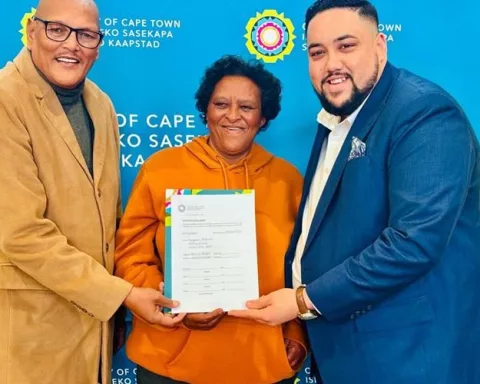Cape Town’s ‘No Cost Transfer’ programme is a revolutionary initiative that transforms tenants into proud property owners. It offers financial support for attorney transfer fees and insurance costs, eradicating financial impediments that typically discourage potential homeowners. The programme focuses on addressing historical injustices and is a launchpad for future initiatives aimed at empowering citizens via property ownership. Cape Town stands firm in its commitment to nurture dignity and inclusivity through property ownership, building a city of hope for all its residents.
What is Cape Town’s ‘No Cost Transfer’ programme?
Cape Town’s ‘No Cost Transfer’ programme is a pioneering initiative that aims to foster dignity through homeownership by transforming tenants into proud property owners. It offers financial support for attorney transfer fees and insurance costs, eradicating financial impediments that typically discourage potential homeowners. The programme focuses on property transfers involving legal tenants of City-owned rental units and purchasers of delayed transfer units and historical serviced sites. It has been designed to address historical injustices and is a launchpad for future initiatives aimed at empowering citizens via property ownership.
The Genesis of a Novel Programme
In an extraordinary shift from generational tradition towards inclusivity, Cape Town has transformed numerous residents from mere tenants to proud property owners via its pioneering ‘No Cost Transfer’ initiative. This unparalleled programme, which stands as a first in South Africa, was unveiled a year back with the primary objective of fostering dignity through homeownership.
The trailblazing initiative, led by Cape Town Mayor, Geordin Hill-Lewis, signifies the city’s unwavering dedication to uplifting its residents. It stands as a robust testament to the city’s resolve to forge an inclusive society. Hill-Lewis sheds light on the philosophy driving the programme, “Our objective is focused on bolstering dignity and inclusivity by enabling property ownership. As the sole metro in South Africa offering such a unique initiative, our attention isn’t merely centred around housing provision, but also on ensuring the delivery framework is deeply rooted in dignity.”
Unfolding the Programme’s Key Features
Under this empowering programme, an impressive 22,000 city-owned rental properties or serviced plots have been identified for potential homeownership. Accompanied by a fiscal allotment nearing R40 million, designated for these ‘no-cost transfers’ over the subsequent three years, the programme aspires to harmoniously blend accessibility with opportunity.
The initiative’s crown jewel lies in the financial support extended by the city for attorney transfer fees and insurance costs. This financial aid stretches from the point of sale until the property is officially registered, thus eradicating financial impediments that typically discourage potential homeowners. Hill-Lewis underlines that the ‘No Cost Transfer’ programme serves as a launchpad for future initiatives aimed at empowering citizens via property ownership.
Addressing Historical Inequalities and Streamlining Processes
Beyond transforming the cityscape, the programme has also taken significant strides in remedying historical injustices. Carl Pophaim, the Mayoral Committee Member for City Human Settlements, echoes these sentiments, “Securing property ownership, once an unattainable dream due to apartheid legislation, has now emerged as one of the most formidable tools of empowerment and redress.”
The ‘No Cost Transfer’ initiative follows a simplified yet effective process. The focus primarily lies on property transfers involving legal tenants of City-owned rental units and purchasers of delayed transfer units and historical serviced sites. This programme is the fruit borne out of the tireless efforts of everyone involved, their invaluable contribution has laid a solid foundation for the programme’s success.
Steadfast Commitment to a Brighter Future
Looking forward towards the horizon, Cape Town remains steadfast in its commitment to expanding this initiative in the forthcoming year. Hill-Lewis concludes on a promising note, “We will persistently strive to enhance this programme in the upcoming year, instilling the sense of empowerment associated with property ownership in future generations. Our no-cost transfer programme underlines our serious dedication to building a city of hope for all Cape Town residents.”
Through the ‘No Cost Transfer’ initiative, Cape Town has demonstrated its firm resolve to nurture dignity and inclusivity through property ownership. While this programme aims to reshape the city’s landscape, it also paves the way for rewriting the life stories of its citizens. It empowers them to assume an active role in their city’s progression and evolution.
1. What is Cape Town’s ‘No Cost Transfer’ programme?
Cape Town’s ‘No Cost Transfer’ programme is a pioneering initiative that aims to foster dignity through homeownership by transforming tenants into proud property owners. It offers financial support for attorney transfer fees and insurance costs, eradicating financial impediments that typically discourage potential homeowners.
2. What is the objective of the ‘No Cost Transfer’ programme?
The primary objective of the ‘No Cost Transfer’ programme is to foster dignity through homeownership by transforming tenants into proud property owners. The programme focuses on property transfers involving legal tenants of City-owned rental units and purchasers of delayed transfer units and historical serviced sites. It has been designed to address historical injustices and is a launchpad for future initiatives aimed at empowering citizens via property ownership.
3. What is the genesis of the ‘No Cost Transfer’ programme?
The ‘No Cost Transfer’ programme was unveiled a year back with the primary objective of fostering dignity through homeownership. This unparalleled programme, which stands as a first in South Africa, signifies the city’s unwavering dedication to uplifting its residents and forging an inclusive society.
4. What are the key features of the ‘No Cost Transfer’ programme?
Under this empowering programme, an impressive 22,000 city-owned rental properties or serviced plots have been identified for potential homeownership. Accompanied by a fiscal allotment nearing R40 million, designated for these ‘no-cost transfers’ over the subsequent three years, the programme aspires to harmoniously blend accessibility with opportunity. The initiative’s crown jewel lies in the financial support extended by the city for attorney transfer fees and insurance costs.
5. How does the ‘No Cost Transfer’ programme address historical inequalities?
The programme has also taken significant strides in remedying historical injustices. The focus primarily lies on property transfers involving legal tenants of City-owned rental units and purchasers of delayed transfer units and historical serviced sites. Securing property ownership, once an unattainable dream due to apartheid legislation, has now emerged as one of the most formidable tools of empowerment and redress.
6. What is Cape Town’s commitment to the future of the ‘No Cost Transfer’ programme?
Cape Town remains steadfast in its commitment to expanding this initiative in the forthcoming year. The ‘No Cost Transfer’ programme underlines the city’s serious dedication to building a city of hope for all Cape Town residents.












